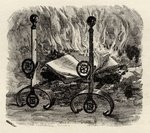 By Sherwood Ross / Staff Writer VT
By Sherwood Ross / Staff Writer VT
The Pentagon has paid anti-war activist Noam Chomsky the highest honor any totalitarian entity can bestow upon an author: they’ve banned his book “Interventions” at Guantanamo Bay prison.
They won’t say precisely why they “honored” Chomsky, but Navy spokesman Lt. Cmdr. Brook DeWalt told the Miami Herald that “Interventions” (City Lights Books) might negatively “impact on (Gitmo’s) good order and discipline.”
The Pentagon, of course, insists on “good order and discipline” running its prison camp. Chomsky likes order, too. What he objects to is the Pentagon spreading disorder globally.
Instead of thanking the Pentagon for his “honor,” Chomsky, is said to be angry. The Herald quotes him as saying, “This happens sometimes in totalitarian regimes.”
Indeed! Nazi newsreels show Hitler’s brown shirts igniting huge bonfires in German streets into which they pitched banned books. Hitler banned over 4,000 books ranging from anti-war novel “All Quiet on the Western Front” by Erich Maria Remarque to Jack London’s “The Call of The Wild.”
And just as Communist Russia wouldn’t let its citizens read “The First Circle” and “Cancer Ward” by Alexander Solzhenitsyn, comrades in the Pentagon refused to allow Gitmo prisoner Hamza al Bahlul to read Chomsky’s “Interventions,” sent him by a defense lawyer.
The Pentagon’s ban mimics Iran’s campaign to kill British novelist Salman Rushdie for his 1988 epic “The Satanic Verses.” Iran’s supreme leader Ayatollah Ruholla Khomeni indicted Rushdie as “blasphemous against Islam.” The Pentagon, according to The Herald, won’t authorize a book that is “anti-American, anti-Semitic, (or) anti-Western.” Note the similarities of the Pentagon’s objections and the Ayatollah’s. Kissin’ cousins, maybe? Some might suspect its Pentagon censorship that’s “anti-American.”
Censorship of Chomsky is not unique. The Pentagon has long pressured Hollywood to show the military in a favorable light. It also bans photographers from war zones if they snap pictures of slain U.S. troops. “I took pictures of something they didn’t like, and they removed me (from Iraq),” complained photographer Zoriah Miller who, like Chomsky, may also be said to be angry. “Deciding what I can and cannot document, I don’t see a clearer definition of censorship,” he said.
Back to Chomsky: What has he written the Pentagon doesn’t want Gitmo prisoners to read? Perhaps it’s where he quotes President Bush’s remark “the United States—alone—has the right to carry out ‘preventive war’…using military force to eliminate a perceived threat…” Chomsky adds this is the “supreme crime” condemned at Nuremberg.
If the Pentagon is upset over “Interventions” they’ll be really ticked at Chomsky’s “Imperial Ambitions (Metropolitan Books).” In that book, he writes about how the Pentagon’s troops burst into Falluja General Hospital, (November, 2004) on asinine grounds it was “a center of propaganda against allied forces,” and kicked the patients out of their beds and handcuffed them and their doctors to the floor, which Chomsky rightly branded “a grave breach of the Geneva Conventions.”
The Pentagon might also oppose Chomsky for accusing them of genocide: “If civilians managed to flee Falluja, they were allowed out—except for men. Men of roughly military age were turned back. That’s what happened in Srebrenica in 1995. The only difference is the United States bombed the Iraqis out of the city, they didn’t truck them out. Women and children were allowed to leave; men were stopped, if they were found, and sent back. They were supposed to be killed. That’s universally called genocide, when the Serbs do it. When we do it, its liberation.”
Banning Chomsky will only call attention to his incisive depictions of Pentagon war crimes. While the Pentagon may worry Chomsky’s work might get Muslim prisoners angry, maybe it should be concerned that Chomsky’s comments such as the following on the Military-Industrial Complex might yet arouse bamboozled and disgusted U.S. taxpayers:
“Empires are costly. Running Iraq is not cheap. Somebody’s paying. Somebody’s paying the corporations that destroyed Iraq and the corporations that are rebuilding it. In both cases, they’re getting paid by the U.S. taxpayer. Those are gifts from U.S. taxpayers to U.S. corporations…..first you destroy Iraq, then you rebuild it. It’s a transfer of wealth from the general population to narrow sectors of the population.” Like the Pentagon, which will reap $664 billion next year.
Time to replace the Pentagon with the Peace Corps. It accomplishes far more with far less.
(Sherwood Ross is a Miami-based writer. Reach him at [email protected])

Sherwood Ross is an award-winning reporter. He served in the U.S Air Force where he contributed to his base newspaper. He later worked for The Miami Herald and Chicago Daily News. He contributed a weekly column on working for a major wire service. He is also an editorial and book publicist. He currently resides in Florida.
ATTENTION READERS
We See The World From All Sides and Want YOU To Be Fully InformedIn fact, intentional disinformation is a disgraceful scourge in media today. So to assuage any possible errant incorrect information posted herein, we strongly encourage you to seek corroboration from other non-VT sources before forming an educated opinion.
About VT - Policies & Disclosures - Comment Policy



